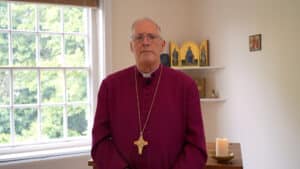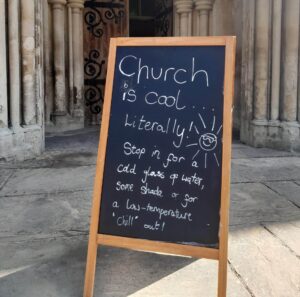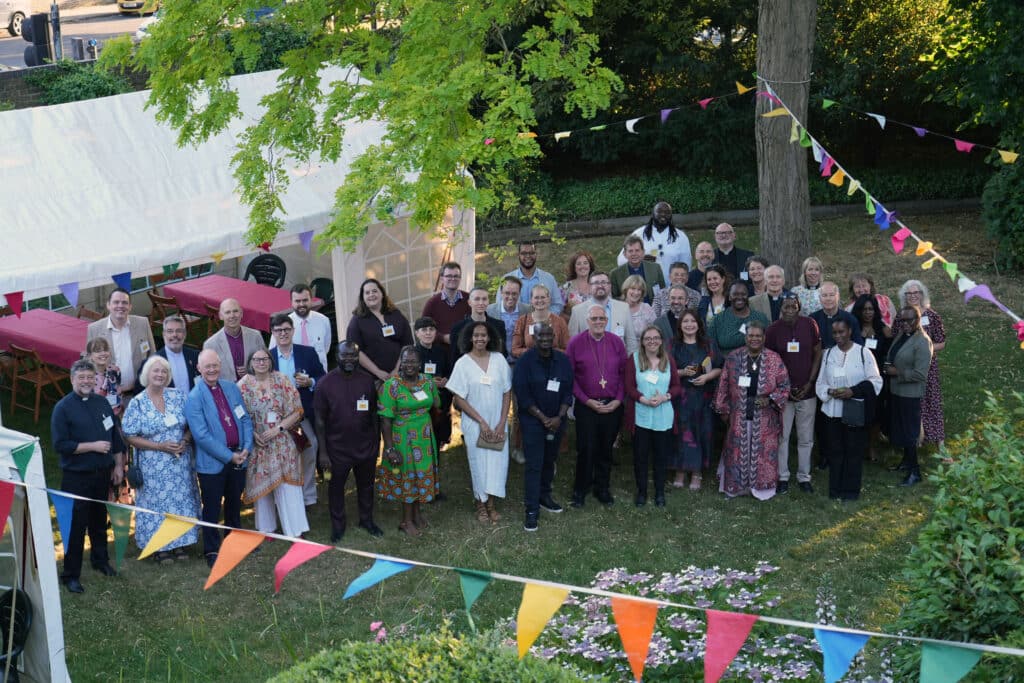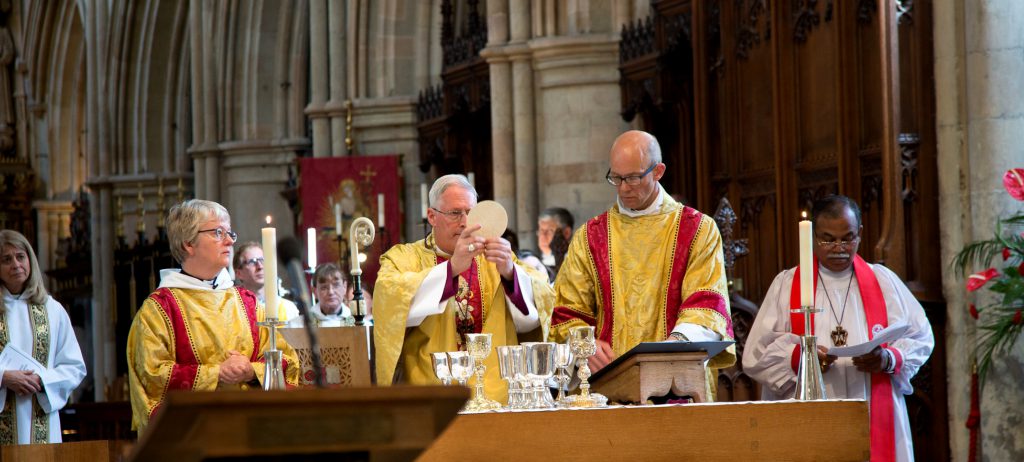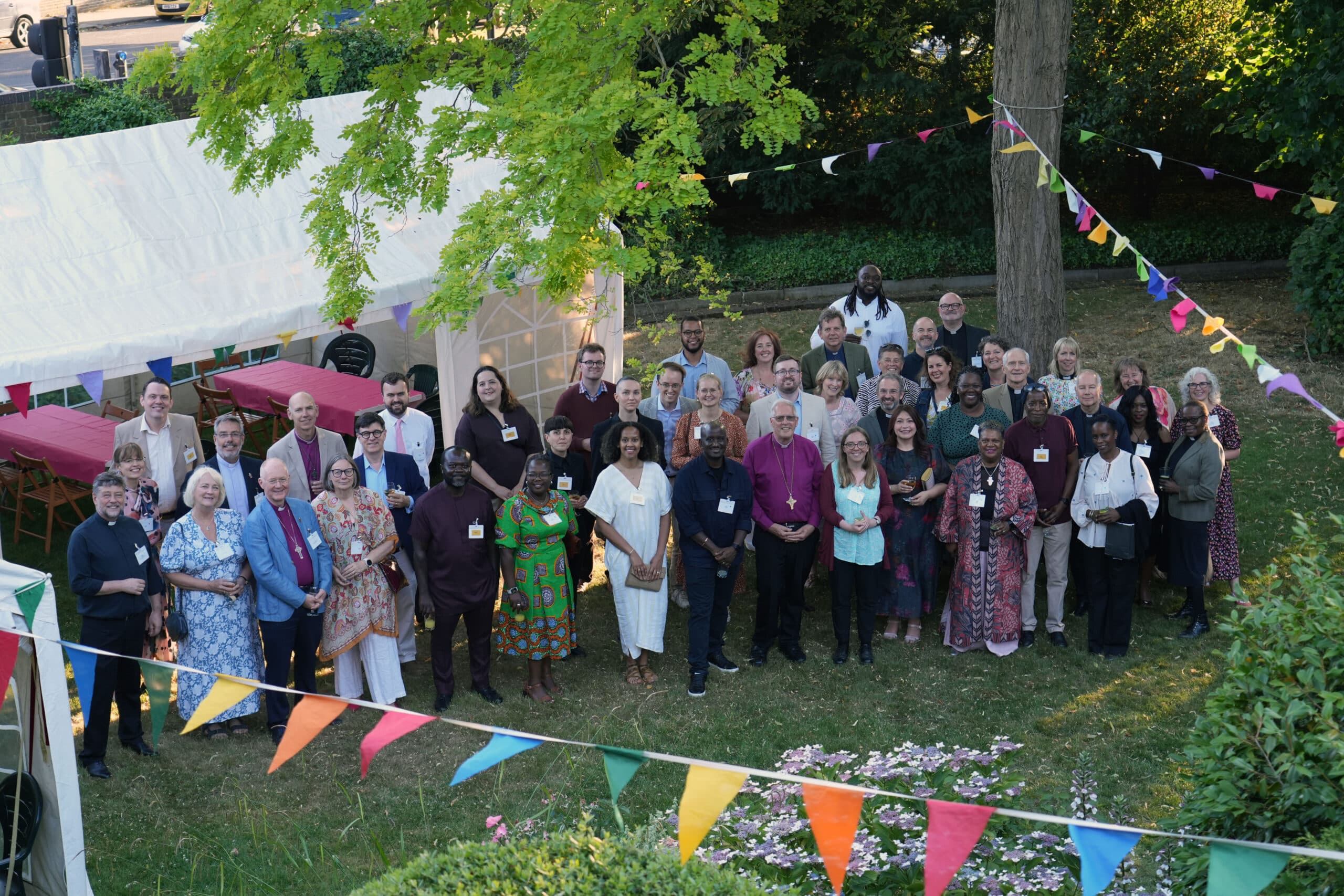Bishop Christopher writes…
In this year in which the Diocese began a formal link with the Diocese of Jerusalem and the Middle East, it seemed appropriate to think about Jerusalem during our Clergy Study Day. We knew from very early in the planning stages that Archbishop Hosam of Jerusalem would not be able to be with us in person and it soon became apparent that gathering so many of the clergy together in one place was a risk in the light of Covid’s continued spread. So, on Tuesday 19 October, about 200 of our clergy gathered online for a morning on Jerusalem the Golden.
Our day began with some joining Morning Prayer from Southwark Cathedral and was followed by a greeting from Archbishop Hosam.
The Dean of St George’s College, Jerusalem, the Very Revd Canon Richard Sewell, who went to St George’s from the Diocese of Southwark and who remains an Honorary Canon of Southwark, then spoke. He was interviewed by the Revd Canon Wendy Robins, who organised the Study Day and who has travelled with me on our Diocesan Pilgrimages to Jerusalem on a number of occasions.
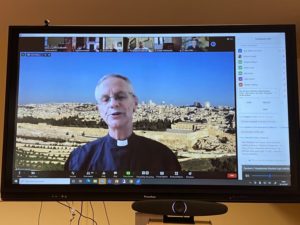
The Very Revd Canon Richard Sewell
He told a moving and difficult story about the situation in Jerusalem and the Occupied Territories. The Revd Canon Giles Fraser then gave us some more information on the Israeli perspective, making it clear to us all how difficult the situation will be to resolve.
We spent some time in conversation in groups and then the Revd Dr Andrew Davison spoke on the Heavenly Jerusalem. He is the Starbridge Senior Lecturer in Theology and Natural Sciences and gave us a very different vision of Jerusalem.
A panel discussion rounded off our stimulating and informative morning before we said Midday Prayer together. It is so refreshing to be able to take time out of our busy schedules, especially after the hard work of the last 18 months, to think about things theologically as well as learn about the day-to-day reality of our brothers and sisters in other parts of the world.
I look forward to next year’s Study Day which I very much hope will be in person in our Cathedral.
The Revd Dr Nicholas Peacock, Team Rector of Cheam Team Ministry, writes…
On Tuesday 19 October, clergy from across the Diocese of Southwark gathered for the annual Clergy Study Day. Although it is usually held in the Cathedral, the impact of the pandemic sadly meant that the event was held online for another year. Although we couldn’t enjoy each other’s company as we might have liked, it was good to see so many faces, both familiar and unfamiliar, spread across several pages of the Zoom gallery view.
The Study Day was focused on the theme of Jerusalem, reflecting the Jerusalem-Southwark Covenant, which was signed earlier in 2021. We all hope that as this new link between the Dioceses of Jerusalem and Southwark develops in the coming years, it will lead to a fruitful partnership.
We began with a recorded address from Archbishop Hosam, who welcomed the relationship as Link Dioceses. We then heard from the Very Revd Canon Richard Sewell, Dean of St George’s College, Jerusalem, who discussed life in and around Jerusalem in conversation with the Revd Canon Wendy Robins. The Revd Dr Andrew Davison concluded our time together. He spoke around the theology of the vision of Heavenly Jerusalem, stressing a constant tension in Christianity between working within the world as it is and looking forward in hope to what might be in the future.
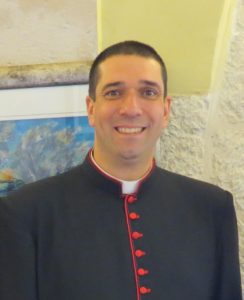
The Most Revd Hosam Naoum
Personally, I found the conversation with Richard Sewell particularly thought-provoking. He reflected on life in Jerusalem, including the ongoing febrile atmosphere in and around the city, the impact of the pandemic on the college and further afield, and the potential for growing the connection between our Dioceses.
Whilst the political situation remains deeply volatile – Jerusalem continues to be a tinder box – Richard expressed a degree of hope which he has found in the relationships he has formed in his relatively short time living in the city. Richard’s thoughts about the differing success of the vaccination program between Israelis and the Palestinians were especially attention-grabbing.
This conversation was refreshing because it led us to look beyond life in our own parishes. The experience of the pandemic over the past two years has seen our worlds dramatically shrink. As clergy, rightly and properly we have had to focus almost entirely on the immediate needs of our own parishes. Our lives have been dominated by risk assessments and regular visits to the Church of England’s website to read up on the latest Coronavirus guidance. We have worked tirelessly to deliver worship, pastoral care, and much vital community-based work within our own parish contexts. Many of us are deeply concerned with how to help our parishes, churches, and congregations recover from the impact of the pandemic.
During our time spent together, to be able to lift our eyes, albeit momentarily, from the pressures and demands of our own parishes was informative and rewarding. It made me remember that, whilst they are undoubtedly important, God is far bigger than the latest risk assessments demanding my attention.
Whilst responding to the immediate needs that present themselves on our doorsteps, it is also essential to look beyond what is right in front of us. There is much that we can learn about ourselves and of God from the experiences and perspectives of others, especially those living out their faith in very different contexts. I look forward to seeing the relationship between the Dioceses of Jerusalem and Southwark flourish in the future. And perhaps, amongst all the ongoing challenges of parish life at present, we should all find time to lift our eyes, even if only briefly.
The Revd Canon Joyce Forbes, Acting Area Dean of the Croydon North Deanery, writes…
The morning started with greetings from Archbishop Hosam, as he couldn’t join us. His replacement was the Very Revd Canon Richard Sewell, Dean of St George’s College, Jerusalem, who had a conversation with us about the realities of living and serving in Jerusalem today, and the pain and joy that it brings.
He gave us some insights into the environment they find themselves in, having to be the person that can meet with all the different groups, but also a prophetic voice. He told us that, notwithstanding all the challenges the pandemic had brought and turmoil in the Holy Land, they still have hope.
Personally, I have never been to Jerusalem – The Holy City, but it is on my bucket list of places I would love to go. It’s the one place I believe is in our consciousness of God. It is described as the Holiest place on earth where God communes with man.
The word Jerusalem means peace. So it was a bit of an eye-opener when we were confronted by the reality that Jerusalem at this moment in time does not have peace, as we may have perceived it to be.
That peace is an operative word, of the kind of peace that Jerusalem is about. For example, the kind of peace that those who are pilgrims to the Holy Land are seeking. The expectation is to visit a place for sanctuary, a place of healing, especially visiting the places or journeying the route that Jesus may have walked and internalising the spiritual food that you receive on that pilgrim journey.
The Dean reassured us that this was not totally gone, but that you had to book through the college to come to Jerusalem, which I believe reassured many who were contemplating visiting Jerusalem, and left us feeling hopeful.
The second session was entitled The Heavenly City, led by The Revd Dr Andrew Davison, and offered a complete contrast with the Jerusalem already presented. This conversation was about the heavenly Jerusalem, in the Bible.
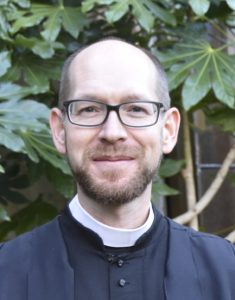
The Revd Dr Andrew Davison
It helped us to see the biblical Jerusalem from the perspective of Revelation 21, where the writer is inviting us to imagine what the heavenly Jerusalem will be like when the old earth and heaven is passed away. We can only imagine that it is this earth that the writer is talking about. Andrew Davison also provided us with a poem by Bernard of Cluney – Jerusalem the Golden. This was not new to me nor many on the day, because it is very much one of the hymns which is regularly sung in Church. This, I believe, gives us a vision of Heaven that we aspire to in the future:
Jerusalem the golden,
with milk and honey blest,
beneath your contemplation
sink heart and voice oppressed.
I know not, O I know not,
what joys await us there;
what radiancy of glory,
what bliss beyond compare.





